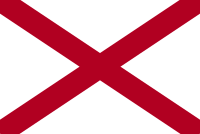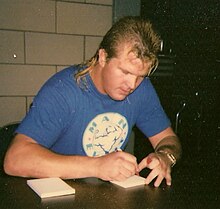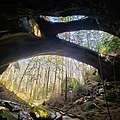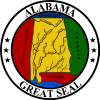The Flag of Alabama Alabama AL -ə-BAM -əstate in the Southeastern region of the United States . It borders Tennessee to the north, Georgia to the east, Florida and the Gulf of Mexico to the south, and Mississippi to the west. Alabama is the 30th largest by area and the 24th-most populous of the 50 U.S. states .
Alabama is nicknamed the Yellowhammer Statestate bird . Alabama is also known as the "Heart of Dixie " and the "Cotton State". The state has diverse geography, with the north dominated by the mountainous Tennessee Valley and the south by Mobile Bay , a historically significant port. Alabama's capital is Montgomery , and its largest city by population and area is Huntsville . Its oldest city is Mobile , founded by French colonists (Alabama Creoles ) in 1702 as the capital of French Louisiana . Greater Birmingham is Alabama's largest metropolitan area and its economic center. Politically, as part of the Deep South , Alabama is predominantly a conservative state, and is known for its Southern culture . Within Alabama, American football , particularly at the college level, plays a major part of the state's culture.
Originally home to many native tribes, present-day Alabama was a Spanish territory beginning in the sixteenth century until the French acquired it in the early eighteenth century. The British won the territory in 1763 until losing it in the American Revolutionary War . Spain held Mobile as part of Spanish West Florida until 1813. In December 1819, Alabama was recognized as a state. During the antebellum period, Alabama was a major producer of cotton , and widely used African American slave labor. In 1861, the state seceded from the United States to become part of the Confederate States of America , with Montgomery acting as its first capital, and rejoined the Union in 1868. Following the American Civil War , Alabama would suffer decades of economic hardship, in part due to agriculture and a few cash crops being the main driver of the state's economy. Similar to other former slave states, Alabamian legislators employed Jim Crow laws from the late 19th century up until the 1960s. High-profile events such as the Selma to Montgomery march made the state a major focal point of the civil rights movement in the 1950s and 1960s. (Full article...
Entries here consist of Good and Featured articles, which meet a core set of high editorial standards. Bobby Lee Eaton professional wrestler best known as "Beautiful" Bobby Eaton . He was most famous for his work in tag teams , especially as one-half of The Midnight Express . Under the management of Jim Cornette , he originally teamed with Dennis Condrey and, later on, with Stan Lane . He also worked with a number of other tag team partners, including Arn Anderson , Koko B. Ware , Steve Keirn , and Lord Steven Regal .
Over the course of his career, which lasted from 1976 to 2015, Eaton wrestled for extended periods of time for various wrestling promotions:
NWA Mid-America ,
Continental Wrestling Association ,
Mid-South Wrestling ,
World Class Championship Wrestling ,
Jim Crockett Promotions ,
World Championship Wrestling , and
Smoky Mountain Wrestling . He also made brief guest appearances for
Extreme Championship Wrestling ,
Total Nonstop Action Wrestling , and a considerable number of
independent wrestling promotions over the years. He held a large number of
championships , including the
NWA/WCW World Tag Team Championship on three occasions. Eaton was inducted into the
Wrestling Observer Newsletter Hall of Fame in 2009 and the
Professional Wrestling Hall of Fame in 2019. (
Full article... )
List of recognized articles
Willie Howard Mays Jr. the Say Hey Kid ", is an American former center fielder in Major League Baseball (MLB). Regarded as one of the greatest players ever, Mays ranks second behind only Babe Ruth on most all-time lists, including those of The Sporting News ESPN . Mays played in the National League (NL) between 1951 and 1973 for the New York / San Francisco Giants and New York Mets .
Born in
Westfield, Alabama , Mays was an all-around athlete. He joined the
Birmingham Black Barons of the
Negro American League in 1948, playing with them until the Giants signed him upon his graduation from high school in 1950. He proceeded to win the
Rookie of the Year Award in 1951 after hitting 20
home runs to help the Giants win their first pennant in 14 years. In 1954, he won the NL
MVP Award , leading the Giants to their last World Series title before their move to the West Coast. His
over-the-shoulder catch of a
Vic Wertz fly ball in Game 1 of the
1954 World Series is one of the most famous baseball plays of all time. After the Giants moved to San Francisco, Mays went on to win another MVP Award in 1965 and also led the Giants to the
1962 World Series , this time losing to the
New York Yankees . He ended his career with a return to New York after a mid-season trade to the
New York Mets in 1972, retiring after the team's trip to the
1973 World Series . He served as a coach for the Mets for the rest of the decade, and later rejoined the Giants as a special assistant to the president and general manager. (
Full article... )
List of selected articles
History of Alabama Huntsville, Alabama Birmingham, Alabama Montgomery, Alabama Tuscaloosa, Alabama George Wallace Dauphin Island, Alabama Talladega, Alabama Talladega Superspeedway University of Alabama COVID-19 pandemic in Alabama Chattahoochee River Alabama people Alabama Department of Corrections Iron & Steel Museum of Alabama LGBT rights in Alabama Jefferson County, Alabama Cannabis in Alabama Russell Cave National Monument Cahaba, Alabama Cahaba River Vulcan statue Confederate States of America Muscle Shoals, Alabama Chickasaw J. Lister Hill Alabama beach mouse Mary Anderson (inventor) Rosa Parks Montgomery bus boycott Nat King Cole Booker T. Washington Dexter Avenue Baptist Church Conecuh Ridge Whiskey Hank Williams The Machine (social group) Helen Keller First White House of the Confederacy Harper Lee Marshall Space Flight Center Dothan, Alabama University of Montevallo Capital City Street Railway Condoleezza Rice Enterprise, Alabama Key Underwood Coon Dog Memorial Graveyard Decatur, Alabama Barber Motorsports Park Hank Aaron Carl Lewis Bo Jackson Lionel Richie Emmylou Harris Jim Nabors Jordan Fisher Terrell Owens Courteney Cox Rickwood Field Octavia Spencer Selma to Montgomery marches History of Montgomery, Alabama WDIG (AM)
The following are images from various Alabama-related articles on Wikipedia.
Image 1 Monte Sano State Park in Huntsville (from
Alabama )
Image 2 Dauphin Street in Mobile (from
Alabama )
Image 4 1725 map of
Mobile , Alabama's first permanent European settlement (from
History of Alabama )
Image 5 Blast furnaces such as the
Tennessee Coal, Iron and Railroad Company 's Ensley Works made
Birmingham an important center for iron production in the early 20th century. (from
History of Alabama )
Image 7 Interstate 59 (co-signed with
Interstate 20 ) approaching
Interstate 65 in downtown Birmingham (from
Alabama )
Image 9 The inauguration of
Jefferson Davis in
Montgomery on February 18, 1861. (from
History of Alabama )
Image 10 Shelby Hall, School of Computing, at the
University of South Alabama in Mobile (from
Alabama )
Image 11 Mercedes-Benz U.S. International in Tuscaloosa County was the first automotive facility to locate within the state. (from
Alabama )
Image 13 Alabama's population density, 2010 (from
Alabama )
Image 14 The Natural Bridge Rock in
Winston County is the longest natural bridge east of the Rockies. (from
Alabama )
Image 15 Union Army troops occupying Courthouse Square in Huntsville, following its capture and occupation by federal forces in 1864 (from
Alabama )
Image 16 Ethnic origins in Alabama (from
Alabama )
Image 17 Map of Alabama from the
National Atlas of the United States (2007) (from
Alabama )
Image 18 Members of the Alabama state legislature on the steps of the Capitol in Montgomery during Reconstruction (1872) (from
History of Alabama )
Image 19 William J. Samford Hall at
Auburn University (from
Alabama )
Image 20 Cliffs at the rim of the
Wetumpka meteorite crater (from
Alabama )
Image 21 Senator
Doug Jones won a
special election in 2017. (from
Alabama )
Image 22 The
State Capitol Building in Montgomery, completed in 1851 (from
Alabama )
Image 23 1823 Map of Alabama (from
History of Alabama )
Image 24 Tornado damage in
Phil Campbell following the statewide
April 27, 2011, tornado outbreak (from
Alabama )
Image 25 Terminal at the
Montgomery Regional Airport in Montgomery (from
Alabama )
Image 27 The
Moundville Archaeological Site in Hale County. It was occupied by Native Americans of the
Mississippian culture from 1000 to 1450 CE. (from
Alabama )
Image 29 Lighthouse on
Guntersville Lake (from
Alabama )
Image 30 Temple B'Nai Sholom in Huntsville, established in 1876. It is the oldest synagogue building in continuous use in the state. (from
Alabama )
Image 31 Hyundai Motor Manufacturing Alabama in Montgomery in 2010 (from
Alabama )
Image 32 Map of counties in Alabama by racial plurality, per the 2020 census
Non-Hispanic White 40–50%
50–60%
60–70%
70–80%
80–90%
90%+
Black or African American 40–50%
50–60%
70–80%
80–90%
(from
Alabama )
Image 33 Von Braun Center in Huntsville (from
Alabama )
Image 34 The main house, built in 1833, at
Thornhill in Greene County. It is a former
Black Belt plantation. (from
Alabama )
Image 35 Airbus Mobile Engineering Center at the Brookley Aeroplex in Mobile (from
Alabama )
Image 36 Mobile is the birthplace of Mardi Gras in the U.S. (from
Alabama )
Image 37 The developing skyline of Birmingham in 1915 (from
Alabama )
Image 38 Artists conception of
Moundville , a
Mississippian culture site on the Black Warrior River in Hale County (from
History of Alabama )
Image 39 Harrison Plaza at the
University of North Alabama in Florence. The school was chartered as LaGrange College by the
Alabama Legislature in 1830. (from
Alabama )
Image 40 Aerial view of the port of Mobile (from
Alabama )
Image 42 Alabama's beaches are one of the state's major tourist destinations. (from
Alabama )
Image 43 Artist's conception of the
Taskigi Site , a fortified mound and village near Wetumpka, Alabama (from
History of Alabama )
Image 44 The
Space Shuttle Enterprise being tested at Marshall Space Flight Center in 1978 (from
Alabama )
Image 45 Regions Field in Birmingham (from
Alabama )
Image 47 The former
Mount Sinai School in rural Autauga County, completed in 1919. It was one of the 387
Rosenwald Schools built in the state. (from
Alabama )
Image 48 The
Riverchase Galleria in Hoover, one of the largest shopping centers in the southeast (from
Alabama )
Image 49 A stand of
Cahaba lilies (
Hymenocallis coronaria ) in the
Cahaba River , within the
Cahaba River National Wildlife Refuge (from
Alabama )
Image 50 Highlands United Methodist Church in Birmingham, part of the Five Points South Historic District (from
Alabama )
Image 51 The Islamic Center of Tuscaloosa (from
Alabama )
Image 52 The
Robert Trent Jones Golf Trail has a large economic impact on the state. (from
Alabama )
Image 53 Vestavia Hills High School in the suburbs of Birmingham (from
Alabama )
Image 54 Ono Island in Baldwin County (from
Alabama )
... that Rick Rehm grassroots campaigning, while his opponent attributed it to straight-ticket voting ?
... that Jack Biddle Alabama Legislature as a Democratic , Republican , and independent representative?
... that Huntsville, Alabama
... that the USFL is in talks with officials from Birmingham, Alabama , with the goal of hosting the entirety of the 2022 USFL season
... that Symphyotrichum kentuckiense only found on limestone cedar glades and limestone roadsides in Alabama , Georgia , Kentucky , and Tennessee ?
... that 2000 Alabama Amendment 2 anti-miscegenation laws , was carefully written to avoid legalizing same-sex marriage ?
Category puzzle Select [►] to view subcategories




































































